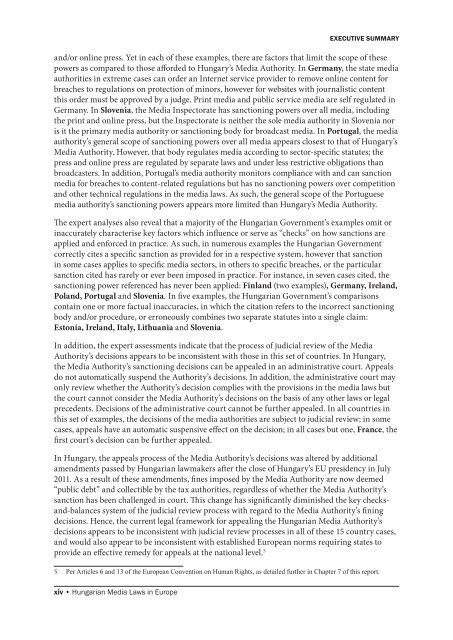An Assessment of the Consistency of Hungary's Media Laws with ...
An Assessment of the Consistency of Hungary's Media Laws with ...
An Assessment of the Consistency of Hungary's Media Laws with ...
Create successful ePaper yourself
Turn your PDF publications into a flip-book with our unique Google optimized e-Paper software.
xiv • Hungarian <strong>Media</strong> <strong>Laws</strong> in Europe<br />
executive summary<br />
and/or online press. yet in each <strong>of</strong> <strong>the</strong>se examples, <strong>the</strong>re are factors that limit <strong>the</strong> scope <strong>of</strong> <strong>the</strong>se<br />
powers as compared to those afforded to Hungary’s <strong>Media</strong> Authority. in Germany, <strong>the</strong> state media<br />
authorities in extreme cases can order an internet service provider to remove online content for<br />
breaches to regulations on protection <strong>of</strong> minors, however for websites <strong>with</strong> journalistic content<br />
this order must be approved by a judge. Print media and public service media are self regulated in<br />
germany. in Slovenia, <strong>the</strong> <strong>Media</strong> inspectorate has sanctioning powers over all media, including<br />
<strong>the</strong> print and online press, but <strong>the</strong> inspectorate is nei<strong>the</strong>r <strong>the</strong> sole media authority in Slovenia nor<br />
is it <strong>the</strong> primary media authority or sanctioning body for broadcast media. in Portugal, <strong>the</strong> media<br />
authority’s general scope <strong>of</strong> sanctioning powers over all media appears closest to that <strong>of</strong> Hungary’s<br />
<strong>Media</strong> Authority. However, that body regulates media according to sector-specific statutes; <strong>the</strong><br />
press and online press are regulated by separate laws and under less restrictive obligations than<br />
broadcasters. in addition, Portugal’s media authority monitors compliance <strong>with</strong> and can sanction<br />
media for breaches to content-related regulations but has no sanctioning powers over competition<br />
and o<strong>the</strong>r technical regulations in <strong>the</strong> media laws. As such, <strong>the</strong> general scope <strong>of</strong> <strong>the</strong> Portuguese<br />
media authority’s sanctioning powers appears more limited than Hungary’s <strong>Media</strong> Authority.<br />
The expert analyses also reveal that a majority <strong>of</strong> <strong>the</strong> Hungarian government’s examples omit or<br />
inaccurately characterise key factors which influence or serve as “checks” on how sanctions are<br />
applied and enforced in practice. As such, in numerous examples <strong>the</strong> Hungarian government<br />
correctly cites a specific sanction as provided for in a respective system, however that sanction<br />
in some cases applies to specific media sectors, in o<strong>the</strong>rs to specific breaches, or <strong>the</strong> particular<br />
sanction cited has rarely or ever been imposed in practice. For instance, in seven cases cited, <strong>the</strong><br />
sanctioning power referenced has never been applied: Finland (two examples), Germany, Ireland,<br />
Poland, Portugal and Slovenia. in five examples, <strong>the</strong> Hungarian government’s comparisons<br />
contain one or more factual inaccuracies, in which <strong>the</strong> citation refers to <strong>the</strong> incorrect sanctioning<br />
body and/or procedure, or erroneously combines two separate statutes into a single claim:<br />
Estonia, Ireland, Italy, Lithuania and Slovenia.<br />
in addition, <strong>the</strong> expert assessments indicate that <strong>the</strong> process <strong>of</strong> judicial review <strong>of</strong> <strong>the</strong> <strong>Media</strong><br />
Authority’s decisions appears to be inconsistent <strong>with</strong> those in this set <strong>of</strong> countries. in Hungary,<br />
<strong>the</strong> <strong>Media</strong> Authority’s sanctioning decisions can be appealed in an administrative court. Appeals<br />
do not automatically suspend <strong>the</strong> Authority’s decisions. in addition, <strong>the</strong> administrative court may<br />
only review whe<strong>the</strong>r <strong>the</strong> Authority’s decision complies <strong>with</strong> <strong>the</strong> provisions in <strong>the</strong> media laws but<br />
<strong>the</strong> court cannot consider <strong>the</strong> <strong>Media</strong> Authority’s decisions on <strong>the</strong> basis <strong>of</strong> any o<strong>the</strong>r laws or legal<br />
precedents. Decisions <strong>of</strong> <strong>the</strong> administrative court cannot be fur<strong>the</strong>r appealed. in all countries in<br />
this set <strong>of</strong> examples, <strong>the</strong> decisions <strong>of</strong> <strong>the</strong> media authorities are subject to judicial review; in some<br />
cases, appeals have an automatic suspensive effect on <strong>the</strong> decision; in all cases but one, France, <strong>the</strong><br />
first court’s decision can be fur<strong>the</strong>r appealed.<br />
in Hungary, <strong>the</strong> appeals process <strong>of</strong> <strong>the</strong> <strong>Media</strong> Authority’s decisions was altered by additional<br />
amendments passed by Hungarian lawmakers after <strong>the</strong> close <strong>of</strong> Hungary’s EU presidency in July<br />
2011. As a result <strong>of</strong> <strong>the</strong>se amendments, fines imposed by <strong>the</strong> <strong>Media</strong> Authority are now deemed<br />
“public debt” and collectible by <strong>the</strong> tax authorities, regardless <strong>of</strong> whe<strong>the</strong>r <strong>the</strong> <strong>Media</strong> Authority’s<br />
sanction has been challenged in court. This change has significantly diminished <strong>the</strong> key checksand-balances<br />
system <strong>of</strong> <strong>the</strong> judicial review process <strong>with</strong> regard to <strong>the</strong> <strong>Media</strong> Authority’s fining<br />
decisions. Hence, <strong>the</strong> current legal framework for appealing <strong>the</strong> Hungarian <strong>Media</strong> Authority’s<br />
decisions appears to be inconsistent <strong>with</strong> judicial review processes in all <strong>of</strong> <strong>the</strong>se 15 country cases,<br />
and would also appear to be inconsistent <strong>with</strong> established European norms requiring states to<br />
provide an effective remedy for appeals at <strong>the</strong> national level. 5<br />
5 Per Articles 6 and 13 <strong>of</strong> <strong>the</strong> European Convention on Human Rights, as detailed fur<strong>the</strong>r in Chapter 7 <strong>of</strong> this report.

















